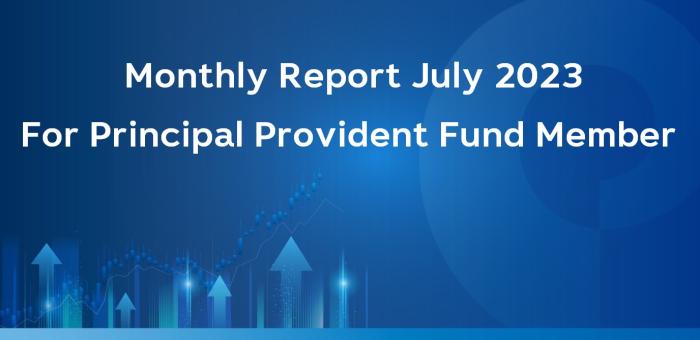Monthly Report July 2023 for Principal Provident Fund Member

Major Indices’ Performance

![]() 1H 2023 Market Review
1H 2023 Market Review
Thai Stock Market: The SET Index dropped 9.92% in the first half of 2023 and closed at 1,503.10 points, under pressure from the US policy rate hikes, global economic slowdown, and uncertainty of new government policies. Stocks that outperformed the overall market continued to benefit from the recovery of the tourism and service sectors and the domestic economy, such as the banking sector (+0.2%),
the tourism sector (-0.3%), and the healthcare sector (-5.1%). The electronics sector could generate the highest return (+6.7%) due to a rise in DELTA stocks (+10.8%) following an increase in foreign technology stocks and its stock splits. In the first half of the year, foreign investors sold a net 107 billion baht of Thai stocks, while domestic institutional investors bought a net 39 billion baht of Thai stocks.
Thai Stock Investment Strategy: We expect SET Index to trade in a range of 1,500 - 1,650 points, driven by positive factors from 1) the recovery of tourism, especially among Chinese tourists 2) continued recovery in domestic consumption and 3) more stable profits of listed companies.
However, the main risk that should be closely monitored is a potential slowdown in the export sector because of uncertainty of economic conditions of trading partners and uncertain policies of the new government.
We maintain a neutral view on the Thai stock market because the positive factors, such as an increase in tourists, especially from China, may be offset by a slowdown in exports due to the economic slowdown in trading partners. The companies expected to deliver better returns than the overall market should have strong profit growth and stable cash flow. These companies are mainly in the sectors that benefit from the recovery of tourism and strong domestic consumption, such as retail, tourism, hospitals, and banks.
Foreign Stock Markets : Global equities rose from late 2022 to the first half of 2023, primarily driven by US technology stocks and Japan stocks, which yielded returns of 32% and 27% respectively. The developed stock market recovered quite well. However, the China stock market remained almost unchanged for the year-to-date (YTD) return due to investors' disappointment with the slower-than-expected recovery of China’s economic growth.
Looking ahead to the second half of the year, the high interest rates in the US and Europe could potentially trigger a recession in Q4 and Q1 of the following year. However, currently the market has not reacted as expected by market participants, particularly in the US stock market, which has increased significantly since the beginning of the year. Consequently, valuation of the US stock market is relatively expensive and the market is likely to be under pressure from inflation risks and tightening loan standards.
Considering the aforementioned factors and the substantial increase in the stock market during the first half of the year, there may be selling pressure and profit-taking, which could potentially lead to a market correction.
Foreign Stock Investment Strategy: With uncertainties prevailing in the stock market, including the risk of an economic recession or the chance of the Fed to raise interest rates twice this year (based on the latest dot plot), we maintain a slightly underweight position on the foreign stock market. Our focus is on investing in companies with good quality and stable growth, characterized by strong and consistent income, robust financial fundamentals, and a focus on ESG factors with continued support from large institutional investors.
We are cautious about investing in US stocks due to their high valuations and the risk of US recession, which could result in downward revisions to listed companies' profits. European stocks are currently less attractive, despite experiencing favorable growth earlier in the year. The persistently high inflation and the ECB's raising interest rates will exert significant pressure on European stock markets in the second half of the year. Although our exposure in China stocks is limited due to the risk of a slow recovery from the country's reopening, the additional stimulus measures under consideration by the authorities and the attractive market valuation still are supporting factors.
Fixed Income Market : Thailand 6-month bond yield curve was flatter. Thailand short to intermediate bonds yield better returns thanks to an increase in the policy interest rate. Thailand long-term bond yields dropped as inflation in Thailand reached a peak in Q3 22.
Bank of Thailand has kept raising interest rates since last year to control inflation and reach a normal level so that Thai economy can be stable in the long term. Since the beginning of 2023 Bank of Thailand has increased its key interest rates 3 times, a total of 0.75%, bringing the policy rate to 2.00%.
Fixed Income Investment Strategy: Although Bank of Thailand raised its interest rate for six consecutive times we expect the interest rate will increase by 0.25 – 0.50% in the second half of the year. However, from our perspective the end of rate hiking cycle is getting close, while Thai bond yields partially reflected the policy rate hikes of the Thai central bank.
Regarding investment strategy for the second half of the year, the fund manager will incrementally increase the average duration of portfolio due to an increase in Thai bond yields. The fund manager will focus on investing in high-quality corporate bonds to receive a good return.
Alternative Asset Market: Overall REITs during the first half of the year were under pressure from high inflation and higher-than-expected interest rates hikes. High inflation was mainly attributed to the rises in energy prices, food prices, transportation costs and wage growth. Although there is a sign of a decrease in inflation, major central banks such as Fed and ECB believed it was necessary to keep hiking interest rates in the first half of the year and they signaled to continue raising interest rates to ensure a problem about high inflation will be solved obviously.
Since the beginning of 2023, investors indeed believed the inflation would drop and big central banks would begin to decrease their interest rates in the second half of this year. However, central banks did not reduce their tightening monetary policies as expected by the market. Consequently, REITs indices dropped in the first half of this year based on different certain factors of their own countries. US REITs and Australia REITs increased by 1.0% and 1.1% while Singapore REITs, Japan REITs, Thai REITs and Hongkong REITs dropped by 1.8%, 1.7%, 8.9% and 12.6% respectively.
For the second half of the year, we view that REITs should remain unchanged if central banks stop their rate hikes as inflation is likely to decrease.
During the first quarter, gold rose thanks to a decrease in concerns about interest rate hikes and weakness in the financial stability of US banks as well as the speculation that the Fed’s interest rate hikes would be paused, resulting in a drop in bond yields. Nevertheless, in the second quarter gold turned out to decrease because of a more hawkish stance of the Fed, causing the market to expect higher peak policy rates and bond yields to increase.
Alternative Asset Investment Strategy: We rate REITs as Slightly Underweight as they have a tendency to face challenging pressures from increases in financial costs and energy prices as well as a likelihood of recession. Individual REIT selection, therefore, is very important to receive a good return as REITs in different countries are expected to perform differently. We will continue to focus on the REITs having strong cash flow or the business model that has minimal impacts from rising energy and financing costs as well as recession, and benefits from China tourists like malls and hotels in Thailand and warehouses in Singapore.
On the other hand, gold is rated Neutral although there is pressure from an increase in interest rates. Nevertheless, we believe that increasing exposure to gold will help diversify portfolio better particularly in a volatile market. Investing in gold through gold funds is our recommendation because they have currency hedging policy of more than 90% of value so that investors can gain investment returns closest to global gold market performance.
![]() Portfolio Adjustment
Portfolio Adjustment
If the US economy is heading for a recession, the US interest rates are still at a high level and China’s economic recovery is not on track, we will maintain slightly underweight view on global equities and REITs and focus on investing in businesses with high quality and stable incomes. We increase exposure to fixed income in order to reduce portfolio volatility as the volatile market can be expected as a result of the above-mentioned uncertainties. Therefore, we suggest that asset allocation should be prioritized to create a proper portfolio by diversifying each asset class based on risk appetites.
Verayuth Halilamien – Head of Fixed Income
Prapot Uancharoenkul – Head of Alternative Investment
Woraphot Khunaprasit – Head of Multi-Asset Investment
Chatree Meechaijaroenying – Head of Equities
Thaned Lertpetchpun – Investment Strategist
Mintra Juntavitchaprapa – Investment Strategist
Read Monthly Report July 2023 for Principal Provident Fund Member


